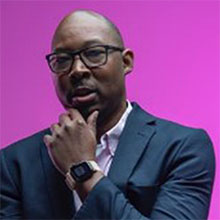Trillium Staff Profile: Demond Hawkins
Date: 10/23/22
 Demond Hawkins is here to make meaningful change.
Demond Hawkins is here to make meaningful change.
As Trillium Community Health Plan’s Health Equity Specialist, Demond collaborates with staff, providers and community-based organizations to identify opportunities to increase access to care, address the social determinants of health, promote organization-wide awareness of diversity, equity and inclusion, and decrease systemic barriers related to racism.
“Health equity drives what we do every day,” said Demond. “And I genuinely love this work. All the experiences I’ve had in my life – the good, the bad and the ugly – have created a space where I can be productive in this role.”
Demond first joined Trillium as a Provider Performance Specialist for the Quality Team. Prior to that, he worked in corporate pharmacy operations for 15 years.
“Growing up, I had dealt with harassment and racial profiling. But after the murder of George Floyd in 2020, I decided I wanted to do more to make a difference,” Demond said.
Demond joined Trillium’s Diversity and Health Equity Committee, which he now co-chairs, and started learning more about the intersection among race, culture and health outcomes.
“I really felt a strong passion for this work and wanted to contribute as much as I could to the equity space,” said Demond. In addition to becoming Trillium’s Health Equity Specialist, Demond serves on the Lane County NAACP Board and co-chairs the Health Committee, as well as participates on the Regional Health Equity Committee for Lane and Douglas Counties and the Oregon Health Equity Alliance. He also serves on the Volunteers in Medicine Board.
Trillium organizes its health equity work around six focus areas: access to care, food insecurity, supportive housing, maternal-child health, behavioral health, and tribal engagement. “We use data and feedback from members, providers, our Community Advisory Councils, and partnering organizations to ensure we’re making a positive impact in the communities we serve,” said Demond. Demond collaborates with a variety of community-based organizations on a daily basis to advance health equity. For example, he’s currently serving as a Lane County Real Men Wear Pink Ambassador for the American Cancer Society.
“With every area of health, we see there are disparities,” said Demond. “The breast cancer death rate for black women is 41% higher than for white women. According to the American Cancer Society, there are many reasons for this, including that black women often don’t have access to the same quality of care and may be more likely to wait longer between mammograms and follow-up exams after getting an abnormal result. I’m honored to help raise awareness about the importance of access to high-quality care and regular screenings. Hopefully we will save more lives.”
One key aspect of Demond’s work is to engage with initiatives that have the power to enact generational change. Trillium is partnering with several Lane County organizations on the Lane County Youth Pathways Project, which seeks to help address the behavioral healthcare provider shortage, increase the representation of the BIPOC community in the behavioral healthcare field, and expand access to culturally specific behavioral healthcare for all ethnicities. In addition, Trillium helps to lead the Justice Equity Diversity & Inclusion (JEDI) workgroup, which is developing a pathway to support future employment of BIPOC Youth Support Specialists.
“These are important initiatives for many reasons. Members of the BIPOC community often don’t seek mental and behavioral healthcare until the crisis stage, and simultaneously we have low representation of the BIPOC community in the behavioral health career field,” Demond explained. “By working with BIPOC students, we are introducing them to the behavioral healthcare field, removing some of the cultural stigma around mental and behavioral health care, and developing a career pathway that will not only help address the shortage of behavioral healthcare providers, but also increase the opportunities for BIPOC members to access culturally responsive care.”
Trillium is committed to engaging with projects like Youth Pathways, the JEDI Workgroup, and the NAACP’s webinar series on anti-racism and patient self-advocacy for underserved communities because they generate multifaceted, comprehensive, and transformative solutions to issues involving health equity and access to care.
“We are always seeking to collaborate with organizations who are addressing access to care and the social determinants of health for their community members,” added Demond. “We listen to what organizations need to better serve their members and look for opportunities to provide support in the best way we can, whether that is funds, people, or other resources,” said Demond. “And we’ll help develop lasting and sustainable solutions. We’re here for the long term.”
If you would like to learn about partnering with Trillium on health equity projects and initiatives, please email Demond Hawkins.

